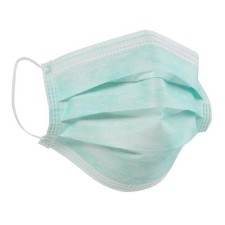The world is now currently facing a global lockdown thanks to the Coronavirus pandemic. The World Health Organization stated that the global market is currently facing a shortage of respiratory masks and other personal protective equipment that helps in protecting against the COVID-19. Following this piece of news, there has been a significant rise in the demand for surgical masks in the absence of the N95 respirator mask which is ideal against the new coronavirus.
While people are using surgical masks in an attempt to stay safe, questions are being raised on its efficacy in preventing the COVID-19. So, what kind of masks should we be preferably using to stay safe during this pandemic situation? Let’s find out.
Since the outbreak of the Coronavirus, people have been rushing to their local pharmacies in a bid to buy facemasks. However, there are many different types of masks available in the market and not all of them are effective in protecting us against this virus. So, which mask should you be buying?
Respirators or Surgical Masks: Which One to Choose?
Currently, the choice is between two different kinds of masks – respirators and surgical masks. Let’s learn about the function of these both in detail
Respirator Mask:

Respirators prevent you from inhaling dust, mist smoke, aerosols, vapors, anesthetic gases, and all other agents that are harmful to human health. Apart from these, the respirators can also protect you against infectious airborne viruses like the Coronavirus, H1N1, SARS, and many more.
Respirators are divided into two kinds based on their function – filtering and insulting. Filtering respirators come with a filtering device and a facepiece. Sometimes the filter is fitted into the facepiece for better breathability.
Not all filter respirators are effective against all kinds of gaseous substances. Depending on the type of filter fitted inside the respirator, the mask will be effective only against certain types of vapors or gases, only against particles, or only against the mist, dust, or smoke. At this juncture, when the world is struggling to fight against the coronavirus, filtering respirators are the best chance for preventing the virus from affecting us.
Surgical Masks:

Unlike the respirator, a surgical mask is disposable medical protective equipment that can be purchased at pharmacies and can protect the wearer from contracting infectious agents that are passed on by “droplets” that comes out when we sneeze or cough. These masks should not be worn for more than 3 to 8 hours and are not meant for long term use.
A surgical mask is effective against contagious biological fluids as it comes with a waterproof lining. However, surgical masks do not guarantee protection against airborne infectious viruses like the coronavirus.
Which Mask Should You Use During the Corona Virus Pandemic?
If a person is suspected to be a carrier of the coronavirus, he or she should immediately wear a surgical mask to stop the spread. In Europe, it has been made mandatory for all kinds of caregivers to wear a class FFP2 or a class FFP3 respirator to stop the virus from spreading further. In the US, the Centers for Disease Control and Prevention has stated that the N95 respirator is ideal for combating the coronavirus as it can filter 95 percent of airborne particles including viruses and bacteria. So, caregivers in the US have been directed to wear a class N, P or R respirator while caring for a coronavirus patient.

Should Your Wear a Reusable Mask or a Disposable Mask?
As stated before surgical masks are not made for long time use and need to be disposed at the required time. Respirators, on the other hand, can be reusable or disposable depending on its manufacturer and filter type. However, it is possible to replace the filter of a respirator and use it again as well.
The shelf life of a respirator or surgical masks depends on the manufacturer and can vary accordingly. Generally, surgical masks can be used for a minimum of three hours and a maximum of eight hours depending on the environment or the contaminant it is being exposed to. Several other external factors such as temperature, the volume of air being breathed in, and humidity also play an important role in keeping the life span of a surgical mask intact.
Respirators, on the other hand, come fitted with gas filters. When the filter is full, the wearer will smell the gas and can get the filter changed immediately. In the same way, if the dust filter of a respiratory mask gets full, it will become increasingly difficult for the wearer to breathe. This will act as an indicator for the user to get the filter replaced.
Given the circumstances the worlds in navigating in, it is best to self-quarantine to flatten the curve of the coronavirus spread. However, there are many for whom self quarantining is not an option. For those, it is best to get your hands on a respiratory mask and use it to stay safe from COVID-19.
![]()



